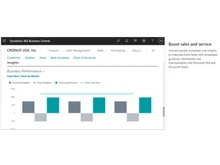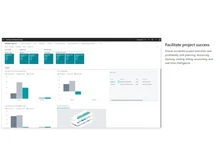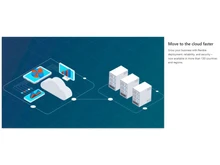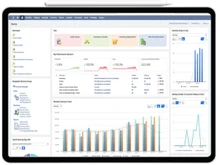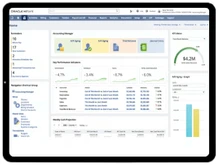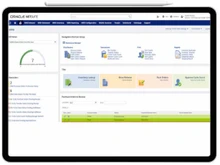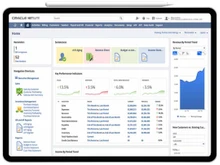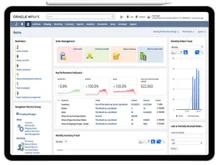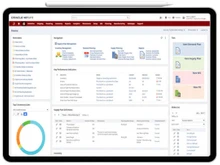ERPs are the backbone of any company of any size. Robust ERPs can simplify the management of operations, manufacturing, financials, and supply chain management.
Here are two equally important worldwide ERP systems - Dynamics 365 Business Central and Oracle NetSuite to know how they could complement your business and make it easier to operate.
Dynamics 365 Business Central Vs Oracle NetSuite
Both systems are intended to improve business efficiency, but the ways they do this differ between Dynamics 365 Business Central and Oracle NetSuite. Let's look at them and compare accordingly.
Overview of Microsoft Dynamics 365 Business Central
Microsoft Dynamics 365 Business Central is an easy-to-implement ERP solution for managing diverse functions of small and medium-sized businesses. It allows the addition of custom functionality based on industry and the region of operation.
Through automation, businesses can streamline sales, manufacturing, project management, shipping, and other processes.
Overview of Oracle NetSuite
Oracle NetSuite is a cloud-based ERP platform with a suite of applications for managing businesses and cost-effectively improving their performance efficiency.
The system provides a 360-degree centralized data view in real-time to manage functions such as order and procurement, inventory, accounting, finance, etc. Customers get options for marketing automation, performance management and payroll, sales CRM, etc.
Comparison of Dynamics 365 Business Central vs Oracle NetSuite ERP In terms of Features
Let us explore various key differences between Dynamics 365 Business Central vs Oracle NetSuite ERP in terms of features, Customization, integration, and other factors to figure out which one suits bests.
- Features
Dynamics 365 Business Central includes modules for financial management, sales and marketing, manufacturing, project management, service management, supply chain management, and warehouse management. Customers can manage sales through Outlook, analyze data in Excel, and share data using Teams.
Oracle NetSuite ERP offers functionalities for global business management, financial planning, accounting, warehouse management, order management, inventory management, and supply chain management.
When comparing Dynamics 365 Business Central vs Oracle NetSuite ERP, look for scalability, customization, ease of use, customer support, and other key factors. The one which suits your business needs is the best.
- Customization
Dynamics 365 Business Central focuses on extensive customization and can integrate with applications offered by Microsoft and third-party applications like PayPal Payments Standard for free. Customers can work with third-party services, use AppSource apps, and create custom apps. There are options to change UI and workspace also.
Oracle NetSuite offers the creation of custom apps, personalization, and integration with third-party solutions via SuiteCloud Platform at an additional charge.
Available integrations include Google Apps, Salesforce, SAP, etc. Sandbox environments for the development and testing of the customizations are also offered at an extra cost. Customizations are carried forward with every new product release so that there are no version lock issues.
- Integration
Dynamics 365 Business Central integrates with Microsoft applications like OneDrive, Power BI, Teams, Power Automate, etc. Integration with third-party services like Salesforce is done primarily through REST APIs.
Oracle NetSuite Adapter enables anyone to build integrations with NetSuite without any coding language. With SuiteCloud framework’s XML-based API, NetSuite allows developers to integrate it with cloud or on-premises solutions.
NetSuite Integration partners support integration with existing systems and applications like PayPal, Google Analytics, AWS, Google Drive, etc.
- Reporting
Dynamics 365 Business Central has a simple in-built reporting feature, which can be enhanced through Power BI integration at an additional cost. With Power BI, customers can include external data sources, customize visualization, and do more for better insights.
Oracle NetSuite offers essential reporting functions to analyze business results in real-time. Its reporting tools are compliant with the standards of different countries. Customers can select from standard or ad hoc reports and set permission-based access to reports. Other features include report scheduling, customization, and report snapshots.
- Add Ons
Dynamics 365 Business Central can connect with other Dynamic 365 apps, MS Office apps, low-code power apps, and add-ons available on MS AppSource. Examples include Job Invoicing Holdback, Prophix, Integrity Data HRP, etc.
NetSuite offers several products for diverse needs. Categories for add-on solutions include integration platforms, eCommerce applications, supply chain, demand planning, etc. Popular solutions are Procore, Boomi, and Shopify, among others.
- Updates
Dynamics 365 Business Central rolls out new functionalities in release waves that cover major and minor cloud-based updates, prioritizing critical fixes. A release plan is available so that customers can stay up to date with the latest update announcements.
Customers can select the time to implement major updates, which are critical for ensuring security and compatibility with other apps.
NetSuite rolls out its cloud-based updates to a small segment first and then to the rest of its business clients. These bi-annual update releases focus on software companies, retailers, manufacturers, service companies, wholesale distributors, and non-profit organizations.
- Release Schedule
Microsoft Dynamics 365 Business Central’s customers receive two major annual updates. The first release covers April to September, and the second release covers October to March. The updates focus on performance improvements, bug fixes, new features, and experience enhancement.
Administrators are given early access to test features that impact user experience before enabling them. Other released system updates are added automatically.
Oracle NetSuite has two major version updates yearly, apart from minor e-Fix Releases. While the precise schedule varies, the first release phase starts in the first quarter (February/ March), and the second phase starts in the third quarter (August/ September).
NetSuite implementation partners can guide customers in testing and implementing upgrades. The upgrades usually include new features or enhancements to existing ones.
- Trial Options
Dynamics 365 Business Central provides a free trial to its customers. Once users create an account through email sign-up, they can use the trial version, excluding support service, for 30 days. It has both sample data and the option to import customers’ data.
An alert is displayed when trial period expiration is nearby. Customers can extend the trial period once on their own and with a Microsoft partner afterward.
NetSuite free trials are available through Oracle’s partner channels. Usually, customers get access to a free test account for 14 days, optional modules, customized datasets, training sessions from certified local professionals, etc.
Comparison Between Dynamics 365 Business Central and Oracle NetSuite ERP In terms of Deployment Type
Both Dynamics 365 Business Central and Oracle NetSuite are cloud based. While selecting between Dynamics 365 Business Central and Oracle NetSuite ERP, figure out which one of the two is compatible with your requirements. This will help in reducing the financial and other hassles after implementation.
Dynamics 365 Business Central or Oracle NetSuite ERP: Which Is Ideal for Your Industry
Both Dynamics 365 Business Central and Oracle NetSuite ERP are ideal for all industries. If you are confused between Dynamics 365 Business Central or Oracle NetSuite ERP, you can check if the software has customizable modules for your industry.
Industry-specific functionalities will ensure higher efficiency and ROI. However, do check for the hidden price, if any.
What to Choose: Dynamics 365 Business Central or Oracle NetSuite?
Dynamics 365 Business Central is a user-friendly cloud ERP that offers advanced financial management features with customizable integrations. Oracle NetSuite offers advanced ERP capabilities through its suite of modules, but it is challenging to work without a Partner to implement new functionalities.
While Oracle NetSuite may be useful for specific use cases, integration with third-party applications is expensive. However, Business Central is better overall as it is a cost-effective ERP that businesses of any size can use to create custom solutions with enhanced experiences.
Transitions from Other Accounting Software to Business Central or NetSuite
You can choose to upgrade to Business Central or NetSuite if you're using accounting software. Both can work for you. Discuss what strategic aspects of your accounting software data you want to transfer with potential partners. And then, who will be responsible for ensuring that the data is transferred appropriately.
If you are currently using Dynamics GP and Dynamics NAV, you will be familiarized with the core functionality of Business Central, even though their interfaces may differ. But if you are moving to NetSuite make sure you discuss in detail with with potential partners.
Which Is Better? - Dynamics 365 Business Central or Oracle NetSuite ERP
Dynamics 365 Business Central and Oracle NetSuite ERP can be used for different purposes and are well-suited for teams with specific needs. If you are looking for a platform that is easy to use, has low barriers to entry, and offers a lot of customization, flexibility, and integration options, you must compare their specifications in detail at the time of the demo. Compare Dynamics 365 Business Central and Oracle NetSuite ERP during the demo to decide which is best for your business.


 20 Ratings & 20 Reviews
20 Ratings & 20 Reviews


